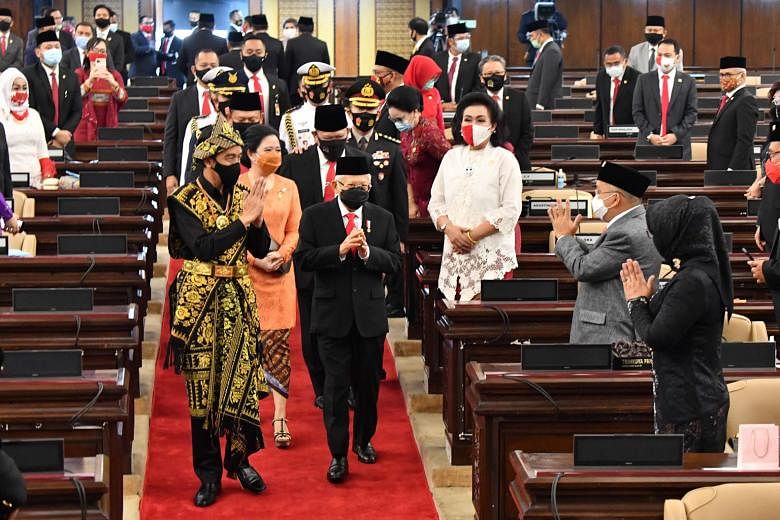JAKARTA • Indonesia must use the pandemic to reboot South-east Asia's biggest economy, including by improving food and energy security, as well as processing more natural resources at home, President Joko Widodo said yesterday.
Mr Joko made the remarks in his annual state of the union speech to Parliament. Owing to coronavirus precautions, fewer than half of the lawmakers were present for his address, with the rest watching online.
The nation is experiencing its worst crisis in more than two decades as restrictions on movement to fight the pandemic and a plunge in global demand have wreaked havoc on households and business.
Likening the current economic situation to "a computer crash" causing stagnation, he said Indonesia, along with other countries, must "shut down, restart and reboot".
"We must not let the crisis bring about setbacks. In fact, we must capitalise on the crisis as a momentum to make a big leap," said Mr Joko, who was wearing a traditional outfit from the Sabu people in the eastern part of the archipelago.
The government expects the economy to post near flat growth this year because of the pandemic, which has infected more than 135,000 people in the country and caused over 6,000 deaths, the highest death toll in South-east Asia. Last year, the economy grew by 5 per cent.
Mr Joko said accelerating reform of the health sector was a top priority, along with strengthening food supply chains, including with a newly planned food estate on Borneo island.
Under energy reforms, Mr Joko highlighted plans to slash expensive oil imports by using fuel made from palm oil.
Indonesia's Pertamina produced a first batch of biodiesel made fully from palm oil last month and is set to produce 1,000 barrels of the fuel at its Dumai refinery.
Indonesia currently has a mandatory use of biodiesel with 30 per cent palm oil content.
The President also stressed a need to push forward the downstream processing of raw materials, including converting coal into gas and nickel ore into ferro nickel and stainless steel, as part of government efforts to create jobs.
Later yesterday, the President proposed to Parliament a 2,747.5 trillion rupiah (S$253.8 billion) budget for next year and pledged to continue efforts to support the economy amid uncertainties surrounding the coronavirus pandemic.
The budget proposal, which represents only a 0.3 per cent increase compared with this year's spending plans, assumed growth in South-east Asia's largest economy will rebound to 4.5 per cent to 5.5 per cent next year.
The proposal assumes a budget deficit of 5.5 per cent of gross domestic product, smaller than the 6.34 per cent expected this year.
"The 2021 state budget bill is designed to accelerate economic recovery nationwide amid the Covid-19 pandemic," Mr Joko said in his budget speech to Parliament, ahead of the country's independence celebrations on Monday.
With government revenue falling, the President has turned to the central bank to share the burden, and said he intends to do so again next year.
United Overseas Bank's Jakarta-based economist Enrico Tanuwidjaja said: "The government is committed to delivering positive growth in 2021 and beyond by fiscal stimulus, and such counter-cyclical fiscal strategy is indeed appropriate."
But the rupiah could weaken further. "As Indonesia will finance its 2021 deficit with central bank cooperation, it will undermine the rupiah on concerns over more debt monetisation," said Asia FX strategist Gao Qi of Scotiabank in Singapore. "The rupiah is likely to test 15,000 (to the US dollar) in the next few weeks."
REUTERS, BLOOMBERG
SEE OPINION

